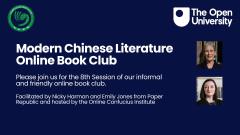Modern Chinese Literature Online Book Club - Session 8
- Dates
- Friday, July 12, 2024 - 13:00 to 14:00
- Location
- Online via MS Teams
- Contactonline-ci@open.ac.uk
Please join us on Friday 12th July (1 PM UK time / 8 PM Beijing tmie ) for the next session of our friendly and informal Modern Chinese Literature Online Book Club. In this session, we'll be discussing 'Notes from a Consulting Room' (诊疗室手记)by Sophie Zuo Fei (昨非), translated by Dylan Levi King and Yun Qin Wang (王韵沁).
You can read the translation of the story in English here: Read Paper Republic: Notes from the Consulting Room (paper-republic.org) and the Chinese version is available here.
You can read more about the author and her work here: https://www.thebeijinger.com/blog/2024/02/28/join-zuo-fei-her-book-launch-tomorrow-feb-29.
We are delighted that the author Sophie Zuo Fei and translator Dylan Levi King will be joining us for the session. Translator Yun Qin Wang (王韵沁) may also be joining subject to availability.
The book club is held in English and you do not need to be able to speak Chinese to attend. It is held online using MS Teams and all are welcome to attend. The session will also be recorded and made available afterwards if you are unable to attend.
About the facilitators:
Nicky Harman
Nicky Harman lives in the UK and translates full-time from Chinese into English, focussing on fiction, literary non-fiction, and occasionally poetry. In 2020, she won a Special Book Award of China. Several of her translations have been recipients of an English PEN Translates award and she has won a Mao Tai Cup People's Literature Chinese-English translation prize (2015), and first prize in the 2013 China International Translation Contest, Chinese-to-English section, with Jia Pingwa’s Backflow River (倒 流河).
Emily Jones
Emily Jones is a founding Trustee of Paper Republic, a charity which promotes Chinese literature in English translation. She is a graduate of Chinese Studies from the University of Cambridge (1998 - 2002). She also studied Chinese at the Chinese universities of Ningbo and Qingdao and was the recipient of a British Centre for Literary Translation mentorship in translation in 2011. Her publications include novels such as Black Holes (性之罪 ) by He Jiahong (何家弘); short stories such as Fiction and Other Stories (李喬短篇小說精選集) by Lee Chiao (李喬), as well as poetry.
Guest attendees
We are delighted that the author Sophie Zuo Fei as well as the translators Dylan Levi King and Yunqin Wang will be joining the session to discuss the story and answer your questions.
Sophie Zuo Fei(昨非)
Zuo Fei lives in Beijing and is a university English teacher as well as running a poetry blog via WeChat that introduces foreign poetry to Chinese readers (外国诗歌精选). She is the Chinese-language editor-in-chief of Spittoon Literary Magazine (www.spittoonlitmag.com) and the featured poet of Spittoon Monthly in May 2020. Her recent work is forthcoming in Mingled Voices 8: The International Proverse Poetry Prize Anthology 2023. She has a collection of essays, The Reed Cutter(割芦苇的人), published by Guangxi Normal University Press.
Dylan Levi King
Dylan Levi King is a writer and translator based in Tokyo. His most recent publication is a translation, with Nicky Harman, of Jia Pingwa's Shaanxi Opera (Amazon Crossing, 2023).
Questions to consider for the discussion:
- Although the note at the end suggests that the events in the story took place around thirty years in the future, what commentary do you think the author is making about our contemporary society?
- How can we understand the cat in the bag, who appears in the conclusion, and in particular its description as being similar to a witch's familiar?
- Does the internet help us to uncover and diagnose our mental illness, or is it simply making us more unhappy and neurotic?
- What piece(s) of music would provide the ideal soundtrack for reading the story?
- The setting of the story, the main character—a psychiatrist, we might assume—and the form—a selection from the doctor's notes—suggest there is commentary here about fundamental questions about the moralization and medicalization of madness—but more practically, what do you make of his choices in treating her?
- Is it sometimes better to entertain and redirect a delusion, rather than to try to convince someone of their deeply-held convictions?
- Did she put the insects in her vagina?
Register to attend
Please register here on Eventbrite to attend. The Teams meeting link will be emailed to you via Eventbrite a week before the event.
Update 26/07/24: Please find the recording below and the transcript is available here.
Contact Us
Online Confucius Institute office
Stuart Hall Building
The Open University
Walton Hall
Milton Keynes
MK7 6AA
Email: Online-CI@open.ac.uk
